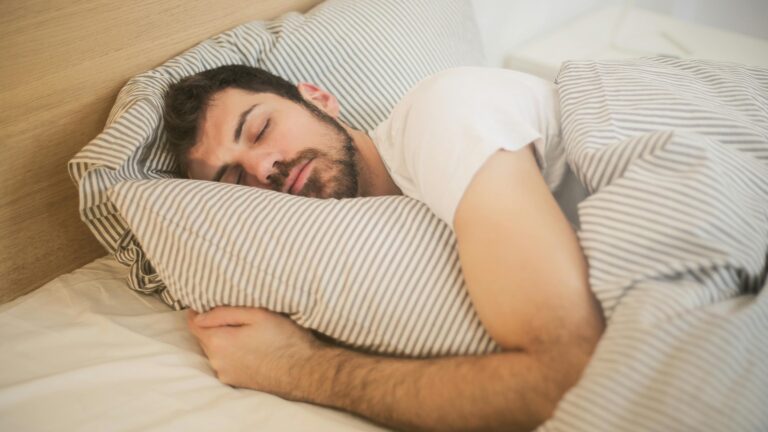Melatonin and testosterone are essential hormones that influence critical aspects of human health. While melatonin is primarily known for regulating the sleep-wake cycle, its effects on testosterone health are less widely recognized but highly significant. Understanding the interplay between these two hormones can provide valuable insights into overall hormonal balance and well-being.
- What is Melatonin and Why is it Important?
- Testosterone: The Key to Male Health
- The Connection Between Melatonin and Testosterone
- Melatonin’s Indirect Effects on Testosterone
- Melatonin Supplementation and Testosterone Levels
- Natural Ways to Balance Melatonin and Testosterone
- Conclusion
- FAQs: The Role of Melatonin in Testosterone Health
- Question: What is the role of melatonin in testosterone health?
- Question: Can melatonin supplementation boost testosterone levels?
- Question: Does poor sleep affect testosterone production?
- Question: Is it safe to use melatonin supplements daily?
- Question: What natural ways can improve both melatonin and testosterone levels?
What is Melatonin and Why is it Important?
Melatonin is a hormone secreted by the pineal gland in the brain. Its primary role is to regulate the body’s internal clock, particularly the sleep-wake cycle. This process, also known as the circadian rhythm, is vital for maintaining overall health. Melatonin production increases in response to darkness, signaling the body to prepare for sleep, and decreases with exposure to light.
Beyond its role in sleep regulation, melatonin acts as a potent antioxidant, helping to protect cells from oxidative stress. It also influences immune system functionality, mood regulation, and even metabolic processes.
Testosterone: The Key to Male Health
Testosterone, the primary male sex hormone, plays a vital role in developing and maintaining male physical characteristics. It supports muscle growth, bone density, libido, and the production of red blood cells. Testosterone is produced in the testes in men and in smaller amounts in the ovaries and adrenal glands in women.
The optimal levels of testosterone are essential for physical and mental health. Low testosterone levels can lead to fatigue, reduced muscle mass, decreased libido, and even mood disorders such as depression.
The Connection Between Melatonin and Testosterone
Emerging research highlights the intricate relationship between melatonin and testosterone. While both hormones have distinct roles, their interaction can significantly impact overall health, particularly in men.
Melatonin’s Role in Protecting Testicular Function
Melatonin has been shown to act as a shield against oxidative damage in the testes. The antioxidant properties of melatonin help protect Leydig cells, which are responsible for testosterone production. By reducing oxidative stress, melatonin supports the healthy functioning of these cells, ensuring optimal testosterone synthesis.
Circadian Rhythm and Testosterone Production
The production of testosterone follows a circadian rhythm, peaking in the early morning hours and declining throughout the day. Disruptions in sleep patterns, often caused by insufficient melatonin production, can negatively affect this rhythm. Chronic sleep deprivation can lead to lower testosterone levels, emphasizing the need for adequate melatonin to maintain hormonal balance.
Melatonin’s Indirect Effects on Testosterone
Stress Reduction and Cortisol Control
High cortisol levels, often associated with stress, can suppress testosterone production. Melatonin, by promoting restful sleep, helps reduce cortisol levels. Lower stress levels contribute to a favorable environment for testosterone production, indirectly linking melatonin to improved testosterone health.
Improved Sleep Quality and Hormonal Recovery
Sleep is a critical period for the body to recover and regulate hormone levels. During deep sleep, the body undergoes repair processes, and hormone production is optimized. Melatonin enhances sleep quality, ensuring the body can maintain healthy testosterone levels during the night.
Melatonin Supplementation and Testosterone Levels
Can Melatonin Boost Testosterone?
While melatonin supplements are widely used for improving sleep, their direct impact on testosterone levels remains a topic of ongoing research. Some studies suggest that melatonin supplementation may positively influence testosterone levels by reducing oxidative stress and supporting sleep quality.
Potential Risks of Overuse
Excessive melatonin supplementation can disrupt the body’s natural hormone production. Long-term use may interfere with natural melatonin synthesis, potentially leading to hormonal imbalances. It is essential to consult with a healthcare provider before starting melatonin supplements, especially for individuals concerned about their testosterone levels.
Natural Ways to Balance Melatonin and Testosterone
Optimize Sleep Hygiene
- Maintain a consistent sleep schedule.
- Avoid exposure to blue light from screens at least an hour before bed.
- Create a dark, quiet, and cool sleeping environment.
Incorporate Antioxidant-Rich Foods
Foods high in antioxidants, such as berries, nuts, and leafy greens, can support melatonin production and protect testosterone-producing cells.
Exercise Regularly
Physical activity boosts testosterone levels and supports the natural production of melatonin by promoting a healthy circadian rhythm.
Reduce Stress
Practices such as meditation, yoga, and deep breathing exercises can lower cortisol levels and create a balanced hormonal environment.
Conclusion
Melatonin and testosterone are interconnected in more ways than one. By regulating sleep, reducing oxidative stress, and supporting hormonal recovery, melatonin plays a crucial role in maintaining healthy testosterone levels. Ensuring adequate melatonin production through good sleep hygiene, a healthy diet, and lifestyle changes can positively impact overall hormonal health.
Studies and Sources
- Melatonin as a Potent Antioxidant
Reiter, R. J., Tan, D. X., & Manchester, L. C. (2007). Melatonin as an antioxidant: Biochemical mechanisms and pathophysiological implications in humans. Acta Biochimica Polonica.
https://www.actabp.pl/pdf/4_2007/661.pdf - Circadian Rhythm and Testosterone
Goh, V. H., & Tong, T. Y. (2010). Sleep, sex steroid hormones, sexual activities, and aging in Asian men. The Journal of Andrology.
https://academic.oup.com/jcem/article/95/8/3838/2596694 - Melatonin’s Role in Testicular Function
Luboshitzky, R., & Lavie, P. (1999). Melatonin and male reproduction. Human Reproduction Update.
https://academic.oup.com/humupd/article/5/5/380/2910378 - Sleep Quality and Testosterone Production
Leproult, R., & Van Cauter, E. (2011). Role of sleep and sleep loss in hormonal release and metabolism. Endocrine Development.
https://pubmed.ncbi.nlm.nih.gov/21502332/ - Melatonin Supplementation and Hormonal Balance
Andersen, L. P. H., Gögenur, I., Rosenberg, J., & Reiter, R. J. (2016). The safety of melatonin in humans. Clinical Drug Investigation.
https://link.springer.com/article/10.1007/s40261-016-0442-6 - Stress and Testosterone Levels
O’Connor, D. B., Archer, J., & Wu, F. C. (2004). Effects of cortisol on testosterone: Implications for stress and aggression research. Hormones and Behavior.
https://www.sciencedirect.com/science/article/abs/pii/S0018506X04000299
These studies provide valuable insights into the relationship between melatonin and testosterone, emphasizing the importance of sleep and oxidative stress management for hormonal health.
FAQs: The Role of Melatonin in Testosterone Health
Question: What is the role of melatonin in testosterone health?
Melatonin supports testosterone health by protecting testicular cells from oxidative damage, promoting hormonal recovery during sleep, and maintaining circadian rhythm balance, which influences testosterone production.
Question: Can melatonin supplementation boost testosterone levels?
While melatonin supplementation can improve sleep quality and reduce oxidative stress, its direct effects on increasing testosterone levels are still under study. It is more likely to support an optimal environment for testosterone production indirectly.
Question: Does poor sleep affect testosterone production?
Yes, inadequate sleep disrupts the circadian rhythm, which can lower testosterone levels. Deep sleep is crucial for the body to regulate hormones and optimize testosterone production.
Question: Is it safe to use melatonin supplements daily?
For most people, short-term melatonin use is safe, but long-term supplementation should be discussed with a healthcare provider, especially for those concerned about natural hormone regulation and testosterone health.
Question: What natural ways can improve both melatonin and testosterone levels?
Improving sleep hygiene, reducing stress, eating antioxidant-rich foods, and exercising regularly can naturally enhance melatonin production and support healthy testosterone levels.
Dopamine and Erectile Dysfunction: Understanding the Connection
Testosterone and Erectile Dysfunction: Addressing Performance Issues in Men





